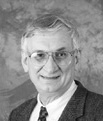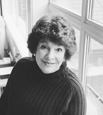Stories by Hope McPherson
Photos by Jimi Lott
and Tara DeJong

Four longtime faculty members retired from Seattle Pacific University this spring, leaving a distinctive legacy in the disciplines of education, electrical engineering and theatre. At the 2000 Faculty Retirement Dinner on May 19, the quartet was simultaneously lauded, roasted and wished well by admiring colleagues. Their individual stories are as interesting as they are diverse.
Edward Bauman
Electrical Engineering
 It's not easy getting Ed Bauman to talk about himself -- even with decades
of accomplishments behind him. He's a retired lieutenant colonel in the U.S.
Air Force with 25 years of active duty; he became Seattle Pacific
University's very first professor and chair of electrical engineering in
1985; and at SPU, he co-founded the High Flight Society with Apollo 15
astronaut Jim Irwin, helping students learn to integrate their faith and
career.
It's not easy getting Ed Bauman to talk about himself -- even with decades
of accomplishments behind him. He's a retired lieutenant colonel in the U.S.
Air Force with 25 years of active duty; he became Seattle Pacific
University's very first professor and chair of electrical engineering in
1985; and at SPU, he co-founded the High Flight Society with Apollo 15
astronaut Jim Irwin, helping students learn to integrate their faith and
career.
Relating these accomplishments and more, Bauman invariably gives the credit to God and others. His chief satisfaction lies elsewhere. "In your professional life, you do research and write papers," he says. "But the real joy of teaching is the students." They recognized his dedication, selecting him as Professor of the Year in 1999.
Students have always been drawn to Bauman. As a 17-year-old high school senior, Melani Plett met Bauman at an SPU campus visit. He was instrumental not only in her choosing Seattle Pacific, but also in her decision to earn a doctorate and teach. Today she's an assistant professor of electrical engineering at SPU. "One of the things Ed models for the faculty is intense caring for all of the students," says Plett. "That leadership is his legacy."
In retirement, Bauman plans to consult and keep in touch with colleagues, including Anthony Donaldson, now the Electrical Engineering Department chair. "I've had a wonderful experience at SPU," he says. "I really felt God led us here, and God has brought a fine man to continue."
Lorelie Olson
Education
 When Lorelie Olson's youngest child entered kindergarten in 1975, she went
to school herself -- to teach. Soon she became a teacher of future teachers
at Seattle Pacific University.
When Lorelie Olson's youngest child entered kindergarten in 1975, she went
to school herself -- to teach. Soon she became a teacher of future teachers
at Seattle Pacific University.
Olson is retiring after 25 years of teaching early childhood and elementary education to undergraduate and graduate students. "She is a model for her students of what she expects from them," says Frank Kline, associate professor of education and assistant dean of teacher education. "She brought to her classes the same level of professionalism that she hopes they bring to their classes."
Says Olson: "I want them to be very intentional and not just do the right thing, but know why they're doing it."
Olson has given students and colleagues much to model. She's a conference speaker on education nationwide; she's taught early childhood education in Hong Kong; and she helped institute a service learning program for education students. As chair of a committee that screens and evaluates student teachers, she helped the School of Education earn its recent re-accreditation. In the process, Washington state gave the screening program special mention. "That was a very rare honor," she says.
In retirement, Olson won't be idle. She'll continue singing in the Choir of the Sound, sailing the San Juan Islands, and fashioning her and her husband's chalet and "naturalistic" garden in Leavenworth, Washington. She will also, she assures, volunteer in the sixth grade class her son teaches.
Elletta Kennison
Education
 "The high points of my career are an accumulation of little things," says
Elletta Kennison, who has taught reading education at Seattle Pacific for 26
years.
"The high points of my career are an accumulation of little things," says
Elletta Kennison, who has taught reading education at Seattle Pacific for 26
years.
Kennison can cite many such "little" things: instilling students with confidence and competence in teaching methods; training Christian teachers in Hong Kong; being part of a School of Education recognized across Washington state for excellence; and working with colleagues. "Working with people in the School of Education has been an absolute delight," she says. "I cannot think of another environment that is so supportive."
Her energy and excitement have rubbed off on others too. "I got a lot out of her classes because of her joy and desire to learn," says Linda Kim Lyons '96. "Now I pass that along to my students." A fifth grade teacher at Seattle's Fairview Christian School, Lyons was an undergraduate and graduate student of Kennison. "She's taught me a lot about how to be an effective teacher."
Kennison won't leave classrooms behind in retirement. She'll teach online courses in SPU's master's degree program, and she'll volunteer in schools in Newport, Oregon, where she and her husband have a seaside home.
"I've been blessed to be at Seattle Pacific all these years," she says. "There's been so much in it for me."
James Chapman
Theatre
 In 1956, James Chapman felt called to the ministry, just not one from a
pulpit. An undergraduate at Cascade College in Portland,
Oregon, he had found his niche: drama. Five years later, he joined the
Seattle Pacific College faculty and, with the help of then President C. Dorr
Demaray, began what is now SPU's
Theatre Department.
In 1956, James Chapman felt called to the ministry, just not one from a
pulpit. An undergraduate at Cascade College in Portland,
Oregon, he had found his niche: drama. Five years later, he joined the
Seattle Pacific College faculty and, with the help of then President C. Dorr
Demaray, began what is now SPU's
Theatre Department.
Today Chapman has seen his "ministry" become a top university theatre program, not only in Seattle but also among Christian universities nationwide. "We've been given the opportunity to build a major that strives to integrate Christianity with the arts," he says, adding that often drama compels actors and audiences to tackle difficult issues in new ways.
During his career, Chapman has seen many of his students go on to launch successful careers in theatre and other professional arenas. Seattle's acclaimed Taproot Theatre, for example, was founded by his students. He was also instrumental in creating the Los Angeles Film Studies Center, which offers students a hands-on introduction to the film industry from a Christian perspective.
Retirement will not end Chapman's SPU involvement. "I'll come back and direct one production a year," Chapman says. He'll also write plays, including one about P.T. Barnum, and a supplemental textbook focusing on issues of Christian artistry for the theatre.
Still, when James Chapman retires, it will be the first time George Scranton experiences SPU without his friend and colleague. An associate professor of theatre, Scranton was Chapman's student 35 years ago. "I learned from his desire, his class work, his passion," he says. "It will be very different here without him."
![]()

| Please
read our
disclaimer.
Send any questions, comments or correspondence about Response to
jgilnett@spu.edu or call 206-281-2051. Copyright © 2000 University Communications, Seattle Pacific University.
Seattle Pacific University |